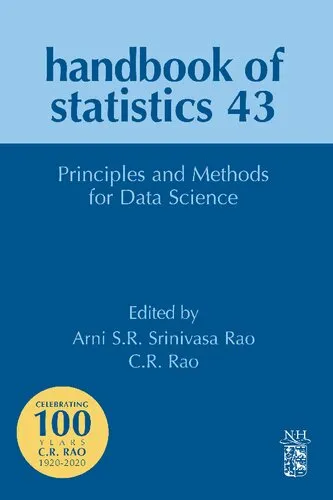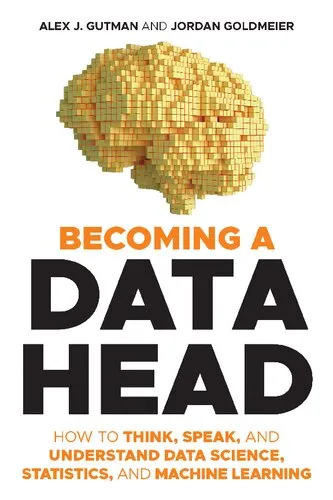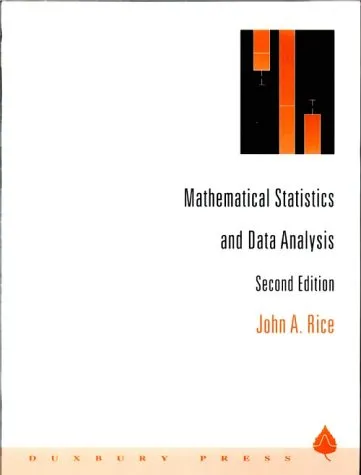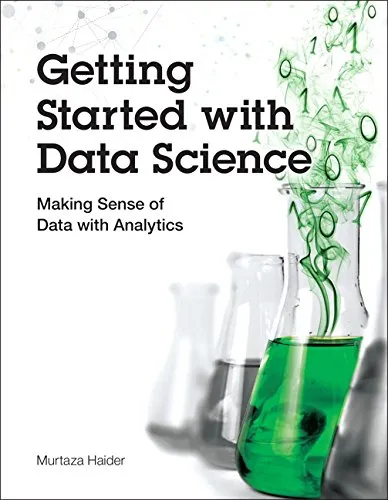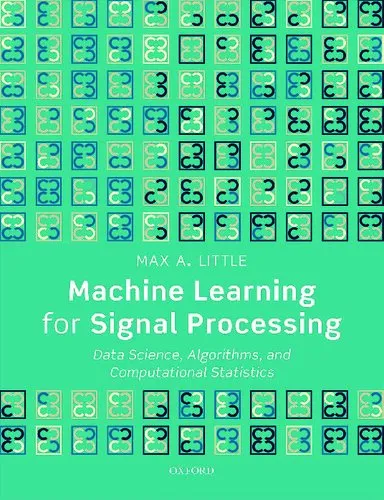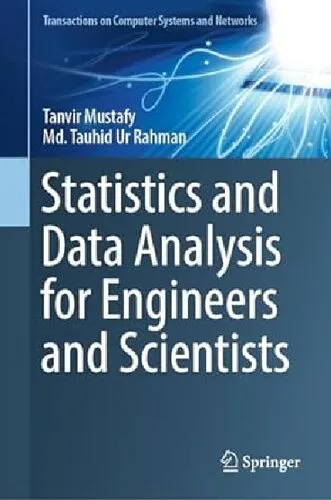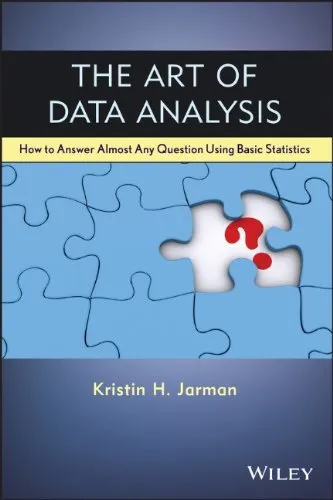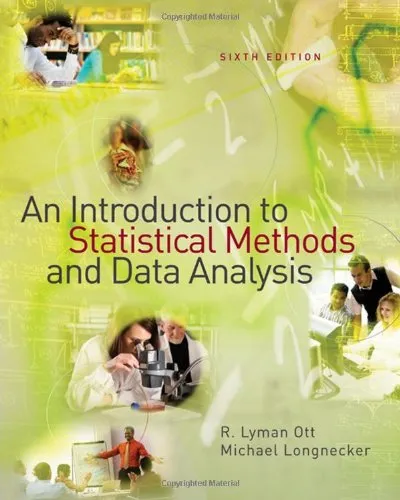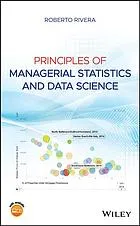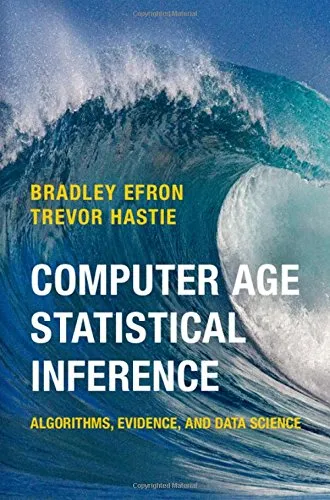Principles and Methods for Data Science (Volume 43) (Handbook of Statistics, Volume 43)
4.5
بر اساس نظر کاربران

شما میتونید سوالاتتون در باره کتاب رو از هوش مصنوعیش بعد از ورود بپرسید
هر دانلود یا پرسش از هوش مصنوعی 2 امتیاز لازم دارد، برای بدست آوردن امتیاز رایگان، به صفحه ی راهنمای امتیازات سر بزنید و یک سری کار ارزشمند انجام بدینکتاب های مرتبط:
معرفی کتاب "Principles and Methods for Data Science (Volume 43)"
کتاب Principles and Methods for Data Science (جلد ۴۳ از مجموعه Handbook of Statistics) یکی از منابع علمی برجسته در حوزه Data Science و روشهای آماری مدرن است. این کتاب به سردبیری Arni S.R. Srinivasa Rao و C.R. Rao تألیف شده و یکی از تازهترین تلاشهای علمی در راستای توسعه و ادغام علوم داده با آمارهای توصیفی و محاسباتی محسوب میشود. در ادامه، بخشهای مختلف این کتاب معرفی و اهمیت آن شرح داده خواهد شد.
خلاصهای از محتوا
این جلد از مجموعه «Handbook of Statistics» به بررسی عمیق اصول، مفاهیم و کاربردهای Data Science میپردازد. محتوا بر اساس توسعه روششناسی، الگوریتمهای آماری، مدلهای یادگیری ماشین و شیوههای مدرن برای تجزیهوتحلیل مجموعه دادههای بزرگ طراحی شده است. کتاب شامل بخشهایی درباره تکنیکهای محاسباتی برای دادههای پیچیده، مدلسازی پیشرفته، و استفاده از ترکیب آمار کلاسیک و مدلهای مبتنی بر Machine Learning است. نویسندگان این اثر تلاش کردهاند ابزارهای عملی برای حل مشکلات واقعی و پیچیده در دنیای علم داده ارائه دهند.
این کتاب به گونهای طراحی شده که نه تنها برای دانشمندان داده با تجربه مفید است، بلکه خوانندگان تازهکار و پژوهشگرانی که مایل به درک عمیقتر مفاهیم آماری و دادهمحور هستند نیز میتوانند از آن بهرهمند شوند.
موارد کلیدی که از این کتاب میآموزید
- کاربردهای اصول آماری در Data Science
- درک روشهای پیشرفته محاسباتی، از جمله کاهش ابعاد و فشردهسازی دادهها
- ادغام تکنیکهای Machine Learning در بررسی دادههای حجیم
- بررسی موردی (Case Studies) از علوم بیومدیکال و شبکههای پیچیده اجتماعی
- تشریح پیچیدگیهای الگوریتمها و روشهایی برای مدیریت دادههای نامتوازن
- یادگیری در مورد روشهای پیشگویانه و کاربردهای آن در علوم پایه و مهندسی
نقلقولهای معروف از کتاب
"Understanding the intricate relationship between statistical principles and data-driven solutions is the cornerstone of modern science."
"Data Science is not limited to computational methods, but it thrives when merged with the robust theoretical foundation of traditional statistics."
اهمیت این کتاب
این کتاب برای محققین، دانشجویان و متخصصانی که در حوزههای Data Science، آمار، یادگیری ماشین، و بیوانفورماتیک فعالیت میکنند، اهمیت ویژهای دارد. با توجه به رشد چشمگیر دادهها در دهههای اخیر، ابزارها و روشهای معرفیشده در این کتاب برای تحلیل، درک و استفاده از دادههای حجیم ضروری است. نقش محوری این کتاب در گردآوری و سازماندهی آخرین متودولوژیهای علمی و کاربردی برای گذار از چالشهای دادههای پیچیده، یکی از دلایل برجستگی آن است.
همچنین، این اثر نه تنها بر جنبههای ریاضی و آماری تمرکز دارد، بلکه با رویکردی چندرشتهای، علوم کامپیوتر، هوش مصنوعی، بیوانفورماتیک و علوم اجتماعی را نیز در بر میگیرد و بدین ترتیب پلی میان تئوری و عمل ایجاد میکند.
کتاب حاضر به شما امکان میدهد تا با دید تازهای به Data Science نگاه کنید و ابزارهای نوین تحلیلی را به صورت عملی و علمی به کار بگیرید.
Introduction to "Principles and Methods for Data Science (Volume 43)"
"Principles and Methods for Data Science (Volume 43)" from the renowned Handbook of Statistics series is an essential resource dedicated to exploring the rapidly growing field of Data Science. Curated by editors Arni S.R. Srinivasa Rao and C.R. Rao, two leading figures in the domain of statistical and mathematical sciences, the book provides an in-depth examination of the principles, techniques, and emerging methodologies shaping modern data science. With every chapter written by accomplished experts in their respective fields, this volume bridges foundational theories with cutting-edge practices, making it an invaluable resource for academics, professionals, and students alike.
As the 43rd installment in the prestigious Handbook of Statistics series, it delves into fundamental aspects of Data Science, including statistical principles, machine learning methods, computational approaches, and real-world applications. It goes beyond simply cataloging techniques by engaging readers in understanding the mathematical and statistical underpinnings of data. The book is designed to empower readers with the knowledge needed to make informed decisions in data-driven environments.
Detailed Summary of the Book
This book is a treasure trove of knowledge, meticulously organized into thematic sections to ensure a holistic understanding of Data Science. The early chapters lay a strong theoretical foundation, covering statistical principles that are indispensable in understanding data characterization, hypothesis testing, and predictive learning. From there, the text transitions seamlessly into the practical realm of machine learning algorithms, such as supervised and unsupervised learning methods, as well as advanced topics in neural networks and deep learning frameworks.
Additional sections explore data pre-processing, computational models, and big data technologies, including distributed systems and scalable analytics tools. The book also addresses complex challenges frequently encountered in the domain, such as handling high-dimensional data, imbalanced datasets, and strategies to mitigate biases in decision-making processes. Contributions from multiple disciplines add richness, connecting data science with epidemiology, economics, business, and environmental science.
A distinctive feature of "Principles and Methods for Data Science" is its focus on interpretability and ethical considerations. The text emphasizes the importance of transparency in algorithmic decision-making and guides readers on implementing solutions that respect privacy, fairness, and accountability. By providing a balanced mix of theory and application, the book equips its audience to not only master existing technologies but also to pioneer innovations in the field.
Key Takeaways
- Comprehensive understanding of foundational statistical principles essential for Data Science.
- Practical insights into machine learning, deep learning, and computational techniques for solving real-world problems.
- Strategies for handling challenges like large-scale data processing, biases, and data privacy.
- Guidance on the ethical implications and responsibilities of working with sensitive and critical data.
- Interdisciplinary approaches to utilize data science across various fields, from healthcare to the natural sciences.
Famous Quotes from the Book
"Data Science is not just about crunching numbers; it’s the art of transforming data into wisdom that drives real-world action."
"In the era of big data, the greatest value lies not in the overwhelming volume of information but in discerning hidden insights buried within it."
"Transparency, accountability, and fairness should be the cornerstones of every algorithm engineered to analyze human data."
Why This Book Matters
In an age where data influences nearly every aspect of our lives, from healthcare to policymaking, "Principles and Methods for Data Science (Volume 43)" stands as an essential guide. Unlike many textbooks that either focus exclusively on theoretical concepts or specific tools, this volume integrates both, making it a well-rounded resource. It not only provides a strong foundation for those new to the field but also excels as a reference for seasoned practitioners seeking to deepen their knowledge.
Furthermore, its discussion on ethical issues and interpretability lends the book a unique relevance in today’s data-driven society. As concerns about data misuse, biases, and privacy breaches grow, this book equips readers with the frameworks and methodologies needed to address such challenges responsibly. At a time when Data Science is powering advancements in artificial intelligence, healthcare, automation, and beyond, this book empowers its readers to play a key role in shaping these innovations.
For students aiming to build a career in Data Science or professionals seeking to expand their understanding, "Principles and Methods for Data Science" is not just a book—it’s a roadmap to mastering the science and art of interpreting and leveraging data for meaningful impact.
دانلود رایگان مستقیم
شما میتونید سوالاتتون در باره کتاب رو از هوش مصنوعیش بعد از ورود بپرسید
دسترسی به کتابها از طریق پلتفرمهای قانونی و کتابخانههای عمومی نه تنها از حقوق نویسندگان و ناشران حمایت میکند، بلکه به پایداری فرهنگ کتابخوانی نیز کمک میرساند. پیش از دانلود، لحظهای به بررسی این گزینهها فکر کنید.
این کتاب رو در پلتفرم های دیگه ببینید
WorldCat به شما کمک میکنه تا کتاب ها رو در کتابخانه های سراسر دنیا پیدا کنید
امتیازها، نظرات تخصصی و صحبت ها درباره کتاب را در Goodreads ببینید
کتابهای کمیاب یا دست دوم را در AbeBooks پیدا کنید و بخرید
1363
بازدید4.5
امتیاز0
نظر98%
رضایتنظرات:
4.5
بر اساس 0 نظر کاربران
Questions & Answers
Ask questions about this book or help others by answering
No questions yet. Be the first to ask!
